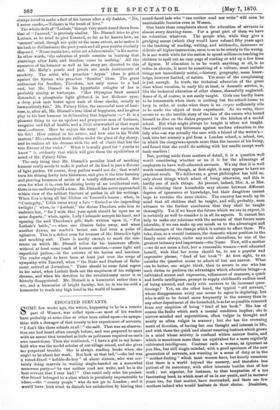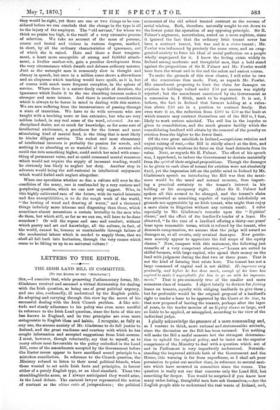EDUCATED SERVANTS.
SOME few weeks ago, the writer, happening to be in a remote part of Wessex, was called upon—as most of his -readers have probably at some time or other been called upon—to sympa- thize with a dowager of that county in her experiences of servants. "I don't like these schools at all ! " she said. That was an observa- tion one had heard often enough before, and was prepared to meet with an assent that trenched as little as politeness required on one's own convictions. Then she continued, "I have a girl in my house- hold who was the model scholar of our village school, and she gives me perpetual trouble. She is always reading books when she ought to be about her work. But look at that lad,"—the lad was a round-faced " hobble-de-hoy " of about sixteen, who was cer- tainly doing marvels in waiting single-handed on a somewhat numerous party—" he can neither read nor write, and he is the best servant that I ever had I" One could only echo his praises. Our friend belonged to a class which is peculiarly impenetrable to ideas,—the "county people" who do not go to London ; and it would have been cruel to disturb her satisfaction by hinting that
round-faced lads who "can neither read nor write" will soon be unattainable luxuries even in Wessex.
One hears these complaints about the education of servants in almost every drawing-room. For a great part of them we have no toleration whatever. The people who, while they give a grudging assent (which they would have refused fifty years ago) to the teaching of reading, writing, and arithmetic, denounce or ridicule all higher instruction, seem to us to be utterly in the wrong. It is not worth while for the nation to spend millions in teaching its children to spell out an easy page of reading or add up a few lines of figures. If education is to be worth anything at all, is to refine or elevate, it must be something of a culture, must include things not immediately useful,—history, geography, some know- ledge, however limited, of nature. Yet some of the complaining is just enough. In truth, the technical education of the great class whose vocation, in early life at least, is domestic service, is, like the technical education of other classes, shamefully neglected. Some of it, of course, is not easily taught. Girls can hardly learn to be housemaids when there is nothing but the school-house to keep in order, or cooks when there is no corpus sufficiently vile to be made the object of their experiment. As we write, there occurs to us the terrible story of the fate of the curate who bound himself to dine on the dishes prepared in the kitchen of a model school. But what might always be taught is -often not taught. One could excuse any bitterness against modern education in the lady who—as was actually the case with a friend of the writer's— took into her nursery a girl from a London school, a school, too, in which the clergyman spends more than the income of his living, and found that she could do nothing with her needle except work book-markers !
But, putting aside these matters of detail, it is a question well worth considering whether or no it is for the advantage of employers to have well-educated servants. We say that it is well worth considering, though, at first sight, it may appear to have no practical result. We deliberate, a great philosopher has told us, only about things which admit of being otherwise, and this is hardly one of such things. At present, indeed, Mrs. A. or Mrs. B. in selecting their households may choose between different degrees of ignorance or knowledge, but their daughters cannot hope to exercise the same choice. The country has made up its mind that all children shall be taught, and will, probably, soon advance to the further conclusion that they shall be taught thoroughly. Yet if we know the future which we are to expect, it is certainly as well to consider it in all its aspects. It cannot but help to make our relations with the servants of that future more tolerable, if we can make up our minds as to the advantages and disadvantages of the change which is certain to affect them. We take, then, as a crucial instance, the domestic whose position in the family must always, under any social alterations, be one of the greatest intimacy and importance—the Nurse. Now, will a mother —we do not mean a fool, but a reasonable woman—well educated herself, wish that her nurse should be, to use a popular and expressive phrase, "fond of her book "? At first sight, to an outsider the question seems to admit of but one answer. What can be better, one might think, than to secure in one who has such duties to perform the advantages which education brings—a cultivated accent and expression, refinement of manners, a quick and fertile intelligence, prompt to supply childhood's endless need of being amused, and ready with answers to its incessant ques- tionings? Yet, on the other hand, the typical "old servant," whose disappearance every one seems to agree in deploring, but who is still to be found more frequently in the nursery than in any other department of the household, is as far as possible removed from any suspicion of being "fond of her book." She has of course the faults which such a mental condition implies ; she is narrow-minded and superstitious, often vulgar in thought and nearly as often vulgar in manner ; but she has the crowning merit of devotion, of having but one thought and interest in life, and with these the quick and almost unerring instinct which grows in a mind whose activity is confined within narrow limits, and which is sometimes more than an equivalent for a more regularly cultivated intelligence. Contrast such a woman, as ignorant as you like, but still single-minded, with a good specimen of the new generation of servants, not wanting in a sense of duty or in the " mother-feeling " which most women have, but keenly conscious that there is a world beyond the nursery, and therefore leas patient of its monotony, with other interests besides that of her work ; not superior, for instance, to that temptation of a too fascinating book to which most of us in our youth, and in maturer years too, for that matter, have succumbed, and there are few mothers indeed who would hesitate in their choice. Doubtless,
they would be right, yet there are one or two things to be con- sidered before we can conclude that the change in the type is all to the injury of the employer. The "old servant," for whom we think no praise too high, is the result of a very extensive process of selection. We take no account of the mass of persons, coarse and brutal and vicious in various degrees, marked, in short, by all the ordinary characteristics of ignorance, out of which she is raised. Here and there a finer tempera- ment, a heart more susceptible of strong and faithful attach- ment, a livelier mother-wit, gain a peculiar development from the very circumstance which dwarfs and debases ordinary natures Just as the untaught man is commonly slow in thought and -clumsy in speech, but once in a million cases shows a shrewdness and an eloquence which teaching would have spoilt, so it is, but -of course with much more frequent exception, in the sphere of service. Where there is a nature finely capable of devotion, the ignorance which limits it to the one absorbing interest makes it stronger and more intense. And there is another consideration which is always to be borne in mind in dealing with this matter. We are now suffering from the inconvenience of passing through a state of transition. We have to do with servants who are taught with a teaching more or leas extensive, but who are very seldom indeed, in any real sense of the word, educated. An un- disciplined desire, not so much for knowledge, as for some sort of intellectual excitement, a greediness for the lowest and most stimulating kind of mental food, is the thing that is most likely to hinder diligent service. The rudest and most elementary of intellectual interests is probably the passion for novels, and nothing is so absorbing or so wasteful of time. A servant who -could rise into something higher, could enrich her mind with some- thing of permanent value, and so could command mental resources which would not require the supply of incessant reading, would in obviously less likely to neglect her duty. Another step in advance would bring the self-restraint in intellectual enjoyment which would forbid such neglect altogether.
When one speculates whether so fine a culture will ever be the .condition of the many, one is confounded by a very curious and perplexing question, which we can now only suggest. Who, in this highly cultivated race of the future, with its varied interests and fine susceptibilities, is to do the rough work of the world, ." the hewing of wood and drawing of water," and a thousand things infinitely more irksome and disgusting than these, which :sometimes almost necessitate a certain brutality in the men who 4:Io them, but which still, as far as we can see, will have to be done somehow? Or will the repose and ease and comfort, without ,which poetry and art and knowledge, all the culture, in fact, of the world, cannot be, become so unattainable through failure of the mechanical labour which is needed to supply them, that we shall all fall back into barbarism, through the very causes which seem to be lifting us up to an universal culture ? .































 Previous page
Previous page